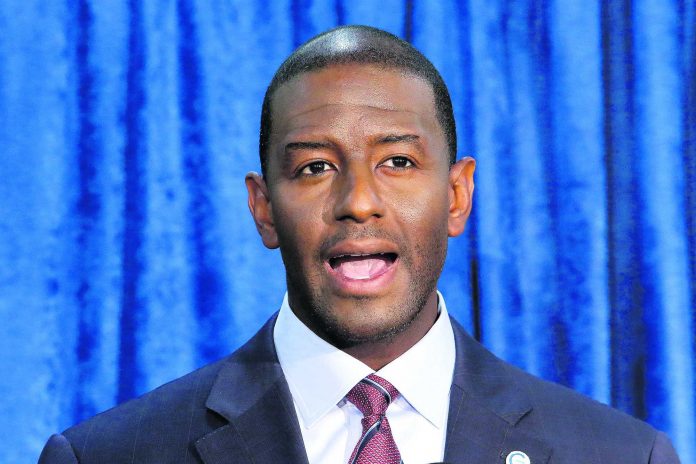Andrew Gillum, Florida’s Democratic nominee for governor in 2018, told a television interviewer he is bisexual, responding to rumors swirling since March after he was found intoxicated and unconscious in a hotel room with two men, including one who works as a male escort.
“I don’t identify as gay but I do identify as bisexual,” Gillum told Tamron Hall on her syndicated talk show, which aired Monday. “And that is something that I have never shared publicly before.”
The former Tallahassee mayor, 41, appeared on the show with his wife, R. Jai. They have three young children. He did not return a call Monday from The Associated Press seeking comment.
He told Hall he began drinking heavily and secretly shortly after narrowly losing the election to Republican Ron DeSantis, even substituting whiskey for his morning coffee, as a way to deal with his depression. He told Hall that he wasn’t sure he wanted to live anymore after a photo got out of him in a Miami Beach hotel room unconscious, nude and lying in a pool of his own vomit.
“I didn’t know that picture was out there,” said Gillum, who was an upset winner in the Florida 2018 Democratic gubernatorial primary and was the first African American to be nominated for the office by either major party. He said he first saw the photo after he checked himself into rehabilitation the weekend after the incident and he cried daily.
“I cried because I was sad to see myself in that place,” he said of the photo. “I cried because I didn’t recognize that person. I cried because I didn’t know it could get that bad.”
R. Jai Gillum said her husband told her before they were married 11 years ago that he was bisexual and she is upset that it is now public knowledge, telling Hall, “I don’t think it is anyone’s business.”
“I don’t think it is fair for people who are not heterosexual, who are not assumed heterosexual that they should ever have to say or disclose what they are because of how judgmental people are,” she told Hall. “So many people just don’t understand bisexuality. They think they can wrap their heads around gay, but bisexuality is just something different.”
She said she wasn’t sure she would have married Gillum if she knew his bisexuality would become public, because she was in her 20s then and wouldn’t have been able to handle it.
Andrew Gillum told Hall he traveled to Miami to officiate at a friend’s wedding, arriving in town a day before his wife and friends did to attend business meetings his aides had set up. He said that on March 12 he found himself drinking alone at a hotel bar, so he reached out to an acquaintance and wound up meeting him at a Miami Beach hotel.
Paramedics were summoned to a room at 1 a.m. March 13 after a third man reported that Gillum’s acquaintance, 30-year-old Travis Dyson, had overdosed. Gillum said he had blacked out three hours earlier after taking a drink and awoke to find police in the room.
Police said Gillum and Dyson were apparently under the influence of an “unknown substance.” Rescuers performed chest compressions on Dyson and he was taken to a hospital, where he recovered.
“Mr. Gillum was unable to communicate because of his inebriated state,” the police report said.
Police said they found baggies of suspected crystal methamphetamine. Gillum told police then and Hall in their interview he was drunk, but did not use meth or other drugs and that tests taken that weekend prove it.
Gillum had stable medical signs and police drove him back to his hotel, where he got a ride to a rental house where his wife had checked in. He was not charged with a crime. One of the men he was with advertised online as a male escort. Gillum denied to Hall having sex with either man.
Gillum announced two days after he was found that he was entering a rehabilitation facility. He told Hall that he needed to get over “the shame” of what happened.
“I spent a lot of time embarrassed over what I don’t recall,” Gillum said.
David Johns, executive director of The National Black Justice Coalition, a gay civil rights group, said Monday that Black members of the LBGTQ community “can relate to the complex feelings” Gillum conveyed in his interview with Hall.
“Gillum’s reflections demonstrate that there must be space in our country for people to be themselves without shame and fear,” Johns said in a statement. “When we are forced by harmful societal expectations to operate in black and white, with no room to express the many gray areas of ourselves that make us who we are, we get hurt.”




















